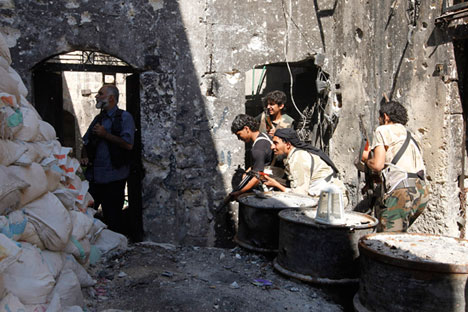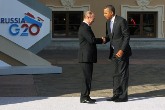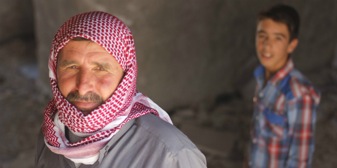Making the Middle East a WMD-free region

The success of the UN in Syrian issue needs to be repeated in case of Palestine. Source: Reuters
Russian Foreign Minister, Sergei Lavrov told Kommersant on September 30 that Moscow would initiate a conference on the Middle East to make it free from weapons of mass destruction (WMDs) including nuclear weapons. He further stated, “in the current situation, it is particularly important to make the non-possession of weapons of mass destruction universal in this explosive region.” The initiative was originally undertaken by Russia, the US and the UK in 2010 as a measure to make the region free from the WMDs. After Syria agreed to dismantle its chemical weapons, and the UN Security Council passed a resolution to this effect last week, the Russian move has attracted more attention in the current global scenario.
Can the Middle East be a zone without WMDs? It is difficult to answer in affirmative at present, but the recent developments are not totally without signs of hope. After Syria agreed to dismantle its chemical weapons under international supervision, the demands for making the whole region free from WMDs have grown significantly within the past one week. The regional powers like Egypt and Saudi Arabia called for Israel to dismantle its nuclear weapons. Egyptian Foreign Minister, Nabil Fahmy, in his speech at the United Nations on September 28 argued, “a new Middle East will not come about without ensuring the right of equal security.” Saudi Arabia, despite its traditional rivalry with Iran, supported the peaceful nuclear program of Iran under international safeguards and applauded Iran for signing the Nuclear Non-Proliferation Treaty (NPT). The Saudi Gazette on September 30 raised the issue of Israel’s nuclear weapons and their implications for peace and stability in the region.
Israel is not a signatory to the NPT and it has not explicitly declared its nuclear weapon status. It is one of the nine countries in the world, which possesses nuclear weapons. The dominant view in Tel Aviv is that Israel needs sophisticated weapons to protect its sovereignty and integrity. As the Jerusalem Post in September 30 issue pointed out, “… US and Israeli officials see Iran’s nuclear activity as the main proliferation threat in the Middle East. They have said a nuclear-free zone could not be a reality until there was broad Arab-Israeli peace and Tehran curbed its nuclear program, which they fear is aimed at developing nuclear weapons capability.” It is worth mentioning that Israel and its Arab neighbours have two wars since the creation of Israel in 1948, and the rigid positions of both the sides have made peace a very expensive commodity in the region.
It may not be an easy task to devise a WMD-free regime in the Middle East. The Russian attempt to insert a clause, in the UNSC resolution on Syrian chemical weapons, on making the region nuclear weapons free was opposed by the US. Though the past weeks have witnessed more interactions between the diplomats and leaders of Russia and the US on the issue of peace in the Middle East, particularly in the context of chemical weapons in Syria, the issue of a WMD-free zone is a difficult issue to contend with. The proposed conference on this issue was supposed to be held last year, but was postponed due to the US.
Related:

Gang of Three feel the squeeze on Syria
It is understandable that in international politics things always do not move on optimistic lines, and also what is optimistic for one country may appear a pessimistic outcome for another country. When interests are perceived different and irreconcilable, the problem arises even without existence of any apparent threat. The recent diplomatic moves of Russia in the region have been perceived in some sections as the return of the old rivalry, as if Russia is trying to outmanoeuvre the US in the region. From another prism, this analysis may be faulty because it was due to mutual cooperation between Russia and the US, an impending war in Syria could be avoided. The war could have proved more devastating than the ongoing violence. More so, the cooperation between the countries also returned back the needed legitimacy to the supreme international organization, the UN.
The WMD issue needs to be seen from this wider perspective. Perhaps the Egyptian Foreign Minister, Fahmy sounded reasonable when he argued in the UN that unless the regional tensions including the Palestine issue is resolved, the region will be fraught with violent conflicts. The success of the UN in Syrian issue needs to be repeated in case of Palestine. Perhaps it is time that Russia and the US revive the active diplomacy of the Middle East Quartet in which both are members to address Israel-Palestine conflict.
With a new leadership in Iran, which appears moderate in its approach to regional and international issues including nuclear weapon proliferation, this is the most opportune time that international diplomacy must display prudence in addressing the issues of WMDs and regional conflicts. Instead of searching for clues for great power rivalry in the Middle East, the current situation provides a perfect opportunity for Russia and the US, and other international powers to coordinate their policies to initiate peace measures in one the most troubled regions in the world. Initiating steps to free the region from WMDs can be one such collaborative effort in this direction.
Dr. Debidatta Aurobinda Mahapatra is an Indian commentator. His areas of interests include conflict, terrorism, peace and development, South Asia, and strategic aspects of Eurasian politics.
All rights reserved by Rossiyskaya Gazeta.
Subscribe
to our newsletter!
Get the week's best stories straight to your inbox
